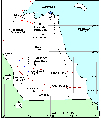
U.S. Marines reported several instances of suspected chemical warfare agent use during combat operations to retake the Kuwaiti Air Base of Al Jaber. Al Jaber is located approximately 50 miles southwest of Kuwait City. From the evening of February 24th through the morning of February 26th 1991, seven chemical alerts resulted in units near Al Jaber increasing chemical protective posture and donning additional equipment while testing for the presence of chemical agents. The initial source of five of the alerts was traced to observation of friendly artillery smoke that was mis-identified as chemical weapons smoke. The specific source of one alert is still under investigation and will be reported upon in the case narrative about the 11th Marines.
The most notable alarm was reported by a Fox vehicle (#5604) in Task Force Ripper, commanded by Gunnery Sergeant George Grass, during the night of February 25, 1991. U.S. armed forces were just integrating the German-made Fox vehicle at the time of Operation Desert Storm and it represented the most sophisticated detection equipment available. As the Fox sat under skies black with the smoke from oil well fires, the MM-1 mass spectrometer alerted for a blister agent (a persistent chemical agent). The alert ceased after several minutes and the source of the alert was not identified.
All of the units in the proximity of each of these alerts initiated the proscribed procedures of taking proper protective posture while testing for chemical agent. The Fox alert as well as the other six alerts were not confirmed by M256A1 Chemical Weapons Detector Kits throughout the area in which Task Force Ripper was deployed. Additionally, no evidence of chemical weapons delivery means, chemical injuries, chemical weapons storage, or actual use anywhere in Kuwait including the Al Jaber area was found during or after the war. Therefore, the assessment that chemical weapons incidents occurred near Al Jaber air base during the ground war is "Unlikely".
In May 1996[2] and May 1997[3] , Gunnery Sergeant (GySgt) George Grass, testified before the Presidential Advisory Committee Gulf War Veterans’ Illnesses about several suspected chemical weapons incidents of which he had personal knowledge of during the Gulf War. GySgt Grass was a Marine Corps nuclear, biological and chemical (NBC) weapons defense specialist and Fox Vehicle Commander. He also testified in December 1996[4] before the Government Reform and Oversight Subcommittee of the House of Representatives. In each testimony, GySgt Grass discussed one specific Fox alert for chemical warfare agents (CWA) at Al Jaber air base in Kuwait. The first public discussion of this event occurred in 1993, when a Marine linked his service with Marine units during the Gulf War to a severe disease he was suffering. He asked several Marine NBC specialists including GySgt Grass to make statements about any CWA exposures they may have detected during the war. Several Marines were then asked to testify in front of congressional committees in 1993[5] and 1994—which they did. In 1994, the Marine Corps initiated an investigation in response that concluded the Marine was not suffering from any classical chemical warfare exposures.[6], [7]
Figure 2. - Al Jaber Air Base, Kuwait.
This current investigation was initiated in response to these statements and testimony regarding the CWA incident at Al Jaber, located at 28� 56� N, 47� 47� E (Figure 2). During the course of the investigation of the Fox alert, several other chemical warfare agent alerts near the base were identified. These incidents were investigated as part of the Al Jaber case. Because of his high public visibility in discussing this case, GySgt Grass is identified by name. All other personnel are identified by Gulf War position level to protect their privacy.
| First Page | Prev Page | Next Page |